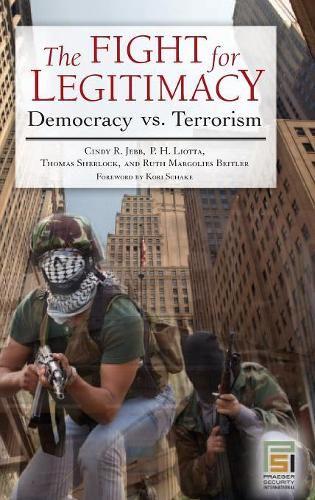
The Fight for Legitimacy: Democracy vs. Terrorism
(Hardback)
Publishing Details
The Fight for Legitimacy: Democracy vs. Terrorism
By (Author) Cindy R. Jebb
By (author) P. H. Liotta
By (author) Thomas Sherlock
By (author) Ruth Margolies Beitler
Bloomsbury Publishing PLC
Praeger Publishers Inc
30th July 2006
United States
Classifications
General
Non Fiction
Politics and government
355.001
Physical Properties
Hardback
200
Description
Terrorism cannot be treated as a monolithic threat. Moreover, as much as we may wish to focus on the terror tactics and terrorist means, we cannot overlook the ends. In fact, good policy can only be crafted with an understanding of the terrorist strategy; that is, how terrorists integrate their means to secure their goals, given their perception of the security environment. The groups covered in this book change and evolve. While their governments must take aggressive actions to secure their populations against attacks, those governments that recognize the real grievances can simultaneously take action that addresses those grievances. This two-pronged approach simultaneously bolsters state legitimacy across the ethnic and majority populations, while demonstrating state effectiveness regarding insecurity. The authors argue that the best way for states to win legitimacy vis-a-vis terrorists is by adhering to liberal democratic values, cooperating with other states, and applying prudent counterterrorist tactics. Inter-state cooperation, which affects domestic and foreign policies, requires some convergence of political cultures among those cooperating states. This book begins by analyzing five hotspot situations and their regional effects: the Basques in Spain, the ethnic Albanians in Macedonia, the Kurds in Turkey, the Chechens and Russia; and the Palestinians, Israel, and a future Palestinian state. These cases shed some light on how we should understand, characterize, and categorize terrorism, and they provide insights into the concepts of political legitimacy, liberal democracy, political culture, and political community. As the United States assesses its homeland defense posture, it must resist any temptation to weaken its liberal democratic values, and, as a superpower, it must encourage other states to adhere to liberal democratic values as well. Liberal democracy is a security imperative in today's global security environment.
Reviews
Four political scientists, three with the US Military Academy at West Point, analyze five terrorist threats against transitional democracies: the Basques in Spain, Kurds in Turkey, Albanians in Macedonia, Chechnya, and Palestine. * Reference & Research Book News *
Author Bio
Cindy R. Jebb, Colonel, USA, is Professor and Deputy Head in the Department of Social Sciences at the United States Military Academy, West Point. Before reporting to West Point, she served in numerous command and staff positions in the United States and overseas. She coauthored Mapping Macedonia, Idea and Identity (Praeger, 2004) with P. H. Liotta. She is also the author of Bridging the Gap: Ethnicity, Legitimacy, and State Alignment in the International System (2004). P. H. Liotta is the Director of the Pell Center, Salve Regina University, and was a Fulbright scholar in Yugoslavia during its breakup as a nation-state. The recipient of a National Endowment for the Arts literature fellowship and the first International Quarterly Crossing Boundaries Award, he is the author of numerous books, among them A Fevered Crescent: Security and Insecurity in The Greater Near East (2006), coauthored with James F. Miskel. Thomas Sherlock is Professor of Comparative Politics and International Relations at the United States Military Academy, West Point, where he is also Head of Comparative Politics in the Department of Social Sciences. He is the author of the forthcoming Insurgent History and the Collapse of the Soviet Union. Ruth Margolies Beitler is an Associate Professor of International Relations and Comparative Politics in the Department of Social Sciences at the United States Military Academy, West Point. She is the author of The Path to Mass Rebellion: An Analysis of Two Intifadas (2004).
